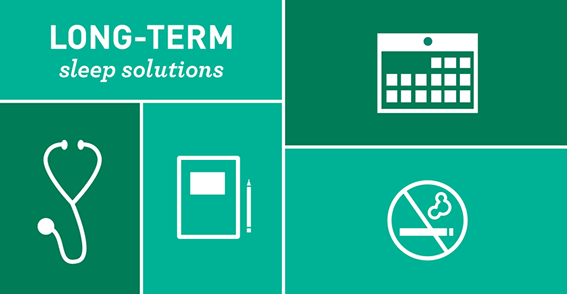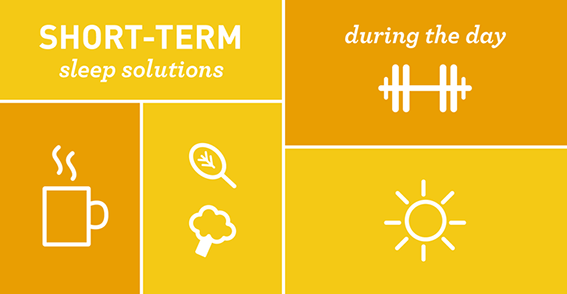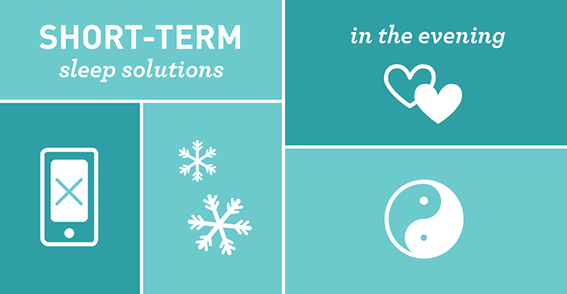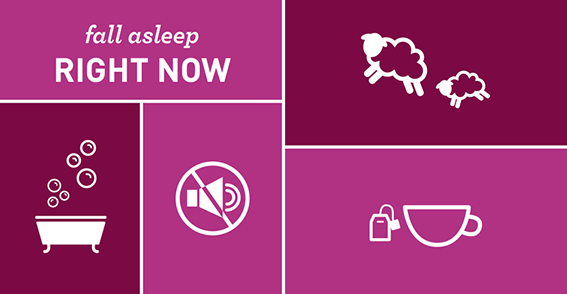32 Solitions for When You Cant't Sleep
1. Keep track. Record how much and when you sleep, fatigue levels throughout the day, and any other symptoms. This serves two purposes: It can identify activities that help or hurt the chances of a good night’s rest, and it’s a useful tool for a doctor or therapist, should you decide to see one. Digital programs like Zeo, YawnLog, and a variety of apps can all make snooze-tracking easier.

2. Try therapy. Cognitive Behavioral Therapy for Insomnia is a pretty common technique. Also called CBT-I, the therapy typically involves self-monitoring, mental strategies (like developing positive thoughts about sleep), and creating an environment that promotes sleep—and it’s been shown to improve sleep quality . Learn these strategies with the help of a therapist or with online guidance or books—both are equally effective ways of implementing CBT-I . Not into seeing a therapist? Check out Sleepio, a digital program that helps users learn about and implement CBT practices from the comfort of their own homes.
3. Establish a regular bedtime routine. Find activities that help you wind down before bed, and stick to the same sleep-wake schedule, even on weekends.
4. Use the bed appropriately. Beds should be reserved for sleep and sex—and nothing else. Bringing work into the bedroom is a sure-fire way to discourage sleep quality.
5. Choose the right mattress. Uncomfortable bedding has been linked to poorer sleep quality, while a comfortable mattress can up the chances of a satisfying snooze .
6. Don’t smoke. Need another reason to quit? Smokers commonly exhibit symptoms of insomnia—possibly because their bodies go into nicotine withdrawal during the night .
7. See a doctor. If you’ve tried everything and nothing’s worked, it might be time to consult a professional. A doctor can help rule out any sleep disorders and identify lifestyle factors or medications that might be getting in the way of a good night’s rest.

32 Solutions for When You Can't Sleep
Pin itShare
8. Exercise early in the day. Studies find moderate aerobic activity can improve insomniacs’ sleep quality. For best results, exercise at least three hours before bedtime so the body has sufficient time to wind down before hitting the sack.
9. Schedule “worry time” during the day. Spend 15 minutes addressing problems (journaling is a good way to start) so they don’t sneak up when your head hits the pillow. If a particular event or stressor is keeping you up at night—and it has a clear end date—the problem may resolve itself naturally.
10. Limit caffeine. It’s tempting to reach for coffee when we’re tired after a poor night’s sleep, but drinking caffeine can make it harder for us to fall asleep at night, creating a vicious cycle . Can’t quit cold turkey? Try limiting caffeine intake to earlier in the day so it’s out of your system by bedtime.
11. Nap the right way. Just 10 to 20 minutes of napping during the day can help us feel rested (and improve our creativity and memory, to boot!) . But try to avoid napping after 3:00 or 4:00pm, as this can make it harder to fall asleep at bedtime .
12. Get outside. Increasing natural light exposure during the day promotes healthy melatonin balance, which can help us get to sleep later in the day.
13. Eat for sleep. Eat foods high in magnesium, like halibut, almonds, cashews, and spinach, and foods high in vitamin B complex, like leafy green vegetables, nuts, and legumes. Some experts also recommend taking supplements of taurine, vitamin B6, and magnesium.

32 Solutions for When You Can't Sleep
Pin itShare
14. Try relaxation techniques. In one study, people who practiced meditation saw improvements in total sleep time and sleep quality. Other relaxation strategies—like yoga, deep breathing, and progressive relaxation—are also effective tools for promoting good sleep.
15. Avoid large meals late in the evening. Jumbo meals pre-bedtime have been linked to trouble falling asleep .
16. Dim the lights two hours before bed. According to one study, exposure to electrical lights between dusk and bedtime might negatively affect our chances at quality sleep. Assuming you don’t want to sit in the dark for hours, find the happy medium by dimming the lights as bedtime draws near. Also consider changing all light bulbs to “soft/warm” varieties with a color temperature less than 3,000 kelvins, all of which can reduce lights’ effects on our nervous systems.
17. Turn off the screens. The artificial (or “blue”) light emitted by screens can disrupt our bodies’ preparations for sleep by stimulating daytime hormones . Reduce exposure by turning off TVs, phones, and computers at least one hour before bedtime. Can’t give up the Daily Show? At least dim a screen’s brightness, either manually or with the help of automated programs.
18. Don’t drink alcohol right before bed. Booze might seem like an obvious choice for calming down pre-bedtime, but it can actually disrupt sleep cycles later in the night. You don’t have to give up the good stuff completely; just drink it with dinner (around 6 o’clock) and skip the nightcap.
19. Don’t use your brain before bed. Don’t work, watch stimulating TV shows, read complex material, or think too hard—about anything—before bedtime; working out the brain keeps the body awake.
20. Have sex or masturbate before bed. Hey, anything for a good night’s rest. Getting our “O” face on pre-bedtime can help us fall asleep.
21. Keep it (dark and) cool. A dark, cool bedroom environment helps promote restful sleep. Program the thermostat so the bedroom’s temperature is between 60 and 75 degrees Fahrenheit (experiment to find what works best for you), and use heavy curtains, blackout shades, or an eye mask to block lights. Also be sure to charge phones and laptops outside the bedroom—even this tiny bit of light can disrupt sleep. If you live in a studio or can’t get away from blue lights for any reason, consider making a (very small) investment in blue light blocking glasses.
22. Consider natural supplements. Valerian and melatonin are two of the most highly recommended supplements (though their efficacy is still under review) . Some other sleep aids can be effective, too.

32 Solutions for When You Can't Sleep
Pin itShare
23. Don’t try to sleep unless you’re sleepy. Yes, it sucks when it’s 2 a.m. and you still don’t feel tired, despite knowing you need rest. But climbing into bed when you don’t feel ready for sleep is setting yourself up for failure. Instead, engage in relaxing activities (like gentle yoga and meditation or listening to soothing music) until you get the strong urge to snooze. If sleep hasn’t come within 20 minutes, get back out of bed and try relaxing activities again until you’re sleepy enough to give it another go.
24. Minimize disturbing noises. If external noises are beyond your control (a busy street outside the window, a neighbor’s barking dog), cover them up with the sound of a bedside fan, a white noise machine, or other sounds that help us sleep.
25. Vent stresses. If designated worry time earlier in the day didn’t fully do the trick, spend some extra time writing down anxieties. Loose-leaf paper works, but if you scrawl your sorrows in a journal or notebook, you can literally close the book on your worries (at least until morning).
26. Brew some chamomile tea. Studies find the humble herb can reduce anxieties, getting us into a better head space for sleep.
27. Try a hot bath or shower. Stepping from warm water into that pre-cooled bedroom will cause body temperatures to drop slightly, which can trigger sleepy feelings by slowing down metabolic activity.
28. Sip some hot milk. Science doesn’t necessarily back the idea that milk facilitates snoozing, but conventional wisdom might be strong enough that our minds still believe moo milk lulls us to sleep.
29. Do some leg exercises. We know; we told you not to exercise before bed. But apparently some easy leg lifts, squats, or your leg exercise of choice can help divert blood flow to the legs and away from the brain. This can help quiet the mind, making it easier to slip into dreamland.
30. Seriously: Count some sheep. It might not work for everybody, but focusing on one thing can help the brain settle down, making sleep more possible. Not a fan of our wooly friends? Focusing on your breath (in, out, in, out) is also an effective way to chill out. Or bust out some of those relaxation techniques you practiced earlier in the evening—they're just as good of a resource in the wee hours.
31. Visualize yourself asleep. Imagine yourself drifting in a blissful slumber while practicing deep breathing and progressive muscle relaxation . Starting at one end of the body and working up or down, clench and then release each section of muscles for instant all-over relaxation.
32. Accept insomnia for what it is. Judgments (“I should be asleep”), comparisons (“my BF/GF/roommate is sleeping; why can’t I?”), and catastrophic thinking (“If I don’t get eight hours’ sleep tonight, I’ll mess up that presentation tomorrow, lose my job, and die tired and alone”) don’t do us any good. Make the night easier by accepting it for what it is, letting go of judgments, and being gentle with yourself. The silver lining? You just might get to see a glorious sunrise.
Events
-
Comfort Sleep at La Casa 2015 Exhibition
in new cairoOpening the
new branch
soon
in new cairo -
Le Marche Exhibition
18:21 Dec 2014Opening the
new Lebanon St,branch
Big discounts
